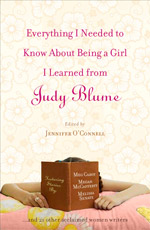Everything
I Needed to Know About Being a Girl I Learned From Judy Blume
 Use the following opportunities to discuss some of Use the following opportunities to discuss some of
Judy Blume's
most popular themes with the
members of your Book Club.
1. In essays like "Then.
Now. Forever." by Megan McCafferty, "The
M Word" by Lara Zeises, and "Do Adults Really Do
That?" by Laura Caldwell, the authors remember learning
about and discussing sex for the first time. Sometimes it's
traumatic, sometimes it's funny, but however it happens, it's
always memorable. Share the story of how your parents first
brought up the "birds & bees," or the time that
your class was separated into groups of boys and girls to watch
informational films on this biological imperative.
- Many of the essays in this book, including "Forever…Again" by
Stacey Ballis, cite the deep impact that Judy Blume's most
banned and celebrated book, Forever, had on their
early ideas about love and sex. What was your first experience
with love like? Why do you think that attitudes about teen
sex have or haven't changed since Forever was first
published?
- Young girls universally struggle through puberty, which often
leaves in its wake identity crises and a scramble to label
and be labeled as girls seek to order their chaotic, changing
worlds. "Boys Like Shiny Things" by Laura Ruby, "Cry,
Linda, Cry" by Meg Cabot, and "Freaks, Geeks, and
Adolescent Revenge Fantasies" by Shanna Swendson describe
the authors' own stories of battered and, ultimately, triumphant
self-esteem. What labels were you given as a child? How did
these affect your sense of identity and the way you related
to others? What, if anything, did you do to shed or strengthen
these identities?
- Sometimes it seems like the female half of the species are
burdened with a rebellious and uncooperative body from the
moment we become self-aware until…well, it never ends!
After reading "The One That Got Away" by Stephanie
Lessing, "I Am" by Erica Orloff, "Vitamin K,
Judy Blume, and the Great Big Bruise" by Julie Kenner, "The
Importance of ABCs" by Kayla Perrin, and "Are You
There, Margaret?" by Alison Pace, what body image
issues from your past came back to haunt you? What physical
attributes do you still battle for control?
- Women's magazines and evening news channels have made much
ado about "friend dates" and other ways that friendships
follow patterns similar to romantic relationships. Authors
Megan Crane and Lynda Curnyn explore these similarities--particularly
the equally dramatic breakups--in their essays "A
Long Time Ago, We Used to Be Friends" and "Breaking
Up Is Hard to Do--Especially with Your BFF." Have you
ever had to break up with a friend? If so, why, and at happened?
If not, why do you think your relationships with women have
remained unscathed?
- Moving and making new friends can be a child's worst nightmare--Tony
Miglione of Judy Blume's Then Again, Maybe I Won't certainly
thought so. So did Berta Platas ("The Wienie Girls' Guide
to Making Friends") and Melissa Senate ("Then Again,
Maybe I…"). What was it like for you making friends
as a child? How has your approach to adjusting to new environments
and making new friends changed as an adult?
- "Are You Available God? My Family Needs Counseling" by
Kyra Davis and "It Wasn't the End of the World" by
Kristin Harmel touchingly revisit the difficulties inherent
in what were once considered "unusual" family
circumstances, such as divorced parents and religious intermarriage.
Davis writes, "Let's face it, all our families
are at least a little dysfunctional." Do you think this
is true? If so, in what ways do you think your own family was
dysfunctional? What Judy Blume books did help or might have
helped you to make sense of the tension broiling around you?
- In her essay "Superfudged," Cara Lockwood compares
her tortured childhood relationship with her younger brother
to that of Judy Blume's Peter Hatcher and his brother, Fudge.
Do you have any siblings? If so, how has your relationship
to each other changed since you were children? If not, how
do you think being an only child affected how you related to
others in your early years?
- Children often feel that the world of adults is mysterious
and incomprehensible, sometimes because their parents purposefully
make it that way! "A Different Kind of Diary" by
Elise Juska, "Mother of All Balancing Acts" by Beth
Kendrick, and "Brave New Kid" by Diana Peterfreund
all share insights about the complexities of Child-Adult relations.
Did you find it difficult to navigate the transformation from
child to young adult to adult with respect to your parents'
treatment of you? What similarities did you find between these
women's stories and your own relationships with your parents?
How are your stories different?
- Jennifer Coburn revisits one of Judy Blume's more serious
social topics--racism--in her essay "Guilty's House." Can
you relate to the described feelings of "white guilt?" Why
or why not? If you are a member of an ethnic minority, what
was your response to reading this blunt portrayal of one girl's
struggle with political correctness?
- In her essay, "We Interrupt Our Regularly Scheduled
Programming for a Judy Blume Moment," Jennifer O'Connell
defines certain poignant moments she believes we all experience
as "Judy Blume Moments." Some of these moments include
those that "make a girl feel like a princess in a blue
cotton nightgown" and "realizing that even as we
get older…we'll always be the girls who play in the
waves and giggle with our friends." Describe some of your
own Judy Blume moments.
<<Back
to Main Judy Blume Book Club page |
